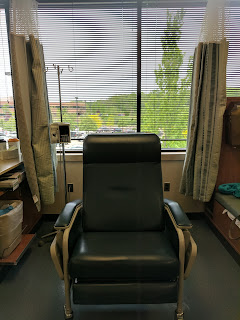Hi lady can you put a <3 on your FB wall, without comment, only a heart, then send this message to your chick contacts. This is for women to remember its the week of breast cancer prevention! Check your boobies!! Hold your finger down on the message and hit forward.
 |
| Messenger Screenshot |
You would be surprised at the number of friends who felt it was appropriate to tell me to "check my boobies!" I don't have boobies, girls, I have scars. I check them pretty frikkin' regularly, like every damn day, in hopes that I'll find the metastasis has resolved. It hasn't. I.can't.even....
The post is annoying for any grammarian; the number of errors is overwhelming. The hearts are annoying. I admire author Jean Šrámková's retort on Medium, entitled:
Stop It, Facebook Women: There is no “Breast Cancer Prevention Week”:
She properly points out: There is no breast cancer prevention week. In fact, there is no "Breast Cancer Prevention." She outlines her objections in general to the post. But the best part:
“Boobies”? Seriously? Are we
on spring break at Myrtle Beach?
She goes on to say: "Mammograms do not prevent breast cancer, nor do breast exams or screening prevent breast cancer. Mammograms and breast exams detect cancer; mammogram results may increase and promote treatment. Huge difference."
The whole awareness thing is out of control. If you have bad genes, you may be able to improve outcomes by detecting early, and by avoiding certain behaviors. If you don't, pay attention to your hormones and yes, get your mamms regularly. It's once every two years between 50 and 74 now. But you won't prevent breast cancer by doing this. You may detect it earlier, which might or might not help you live longer.
To say that you can prevent breast cancer makes it sound like bad behavior causes breast cancer. My response to that: 1. Define bad behavior, and 2. It mostly doesn't. Out of control cells cause breast cancer. Period. Being thinner, not smoking, maybe drinking less and not taking supplemental hormones may help reduce the risk for some, especially those who have a host of genetic predispositions, but some of us can do none of those things and still be in the crosshairs.
What not to say to cancer warriors has been the subject of past posts, if you remember. Add this to them. Don't send me Facebook Messenger memes about checking boobies.
I may not have much advice about what to say; there isn't much. Make sure you don't lose track of me, I suppose. Stay in touch, and don't let petty disagreements rob you of time with me or anyone. You won't get it back. (Yes, the family awfulness is still mostly awful, with one notable exception -- Mom is happy. These sisters are still sisters and always will be.)
I really admired a metavivor named Holley Kitchen about the subject of what to say:
Her video came up today in my Facebook feed as a memory of my post from 2015. Sadly, she is a warrior no more. We've lost another one.
I cannot stress this enough: Forget awareness and prevention. Here's a great series of reasons why:
- The objectification is overwhelming (Save the Ta-Tas???),
- Corruption is rampant in some of the big names, but most importantly,
- The money isn't going where it is needed. It is needed to research the killer, metastatic breast cancer.
Cancer that never leaves the organ it invades rarely kills. Remember that. About 30 to 40 percent of folks diagnosed with cancer of any stage will have metastatic cancer at some point in their lives, whether sooner or later. We don't fully know why, and research focuses on these issues not nearly enough. We need to stop conducting research with stage 1 cells only. We need to ensure that our government has the money to conduct the real research that needs to happen. We can't let up now! About 40,000 of us will die this year alone. That's the awareness you need! You already knew about breast cancer, and that you need mammos. Now know this:
Give your money and your attention to the Stage IVs. The whole rest of the team needs them to survive, so that we all do.
Update on treatment:
I am nearing the end of my first round of Kadcyla. How did it go, you ask? And how is retirement?
I have no data on efficacy. Side effect results are mixed. I develop fevers with and the accompanying "long bone pain" (like you're getting the flu, but much worse) keeps me down for three days or so.
Fatigue is still very present: I feel like a million bucks, carry a box upstairs and I need a nap...that sort of thing, every day. Sleep is not what it should be. GI issues are somewhat better: less heartburn, other issues more or less the same.
I'm still losing weight. I still have peripheral neuropathy, but maybe I have more hair and nails. An exam of my eyes showed there was nothing to worry about in that department.
It's not better or worse than previous treatments. I am worried about progress, but I'll need data to be sure. That will come after round 3 or thereabouts.
Hubby and I have enjoyed several relaxing, enjoyable days together. We aren't in the RV yet (too busy with caregivers every day this week) but we will be soon. I'm adjusting to my new normal of lower energy and appetite. I'm looking forward to some trips and many new things. Life is ok, under the circumstances.
Am I worried about my future? Right now, it's 50/50 that I get to live past the three-year average for people getting the treatment I'm getting. So, yes, I suppose that's a pretty present feature of my life. I own that now. My plan is to survive as long as I would have; it's just not an assumption I can make like it is for most folks. My odds are lower. So, back to the battle. No retreat.
Let me know how yours is going in the comments, or on Facebook.












